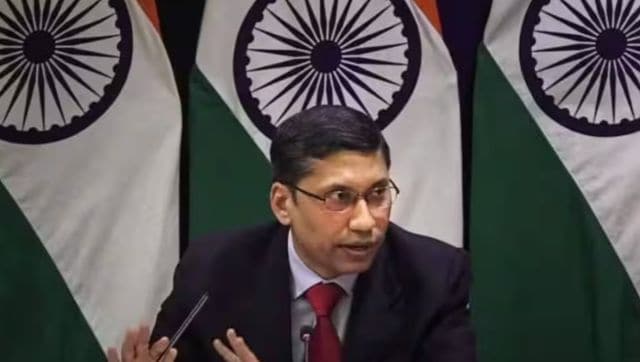MEA Spokesperson Arindam Bagchi
India Thursday said it has been “always supportive of free movement of commercial shipping… and it will continue to monitor situation in the Red Sea.
The statement by Ministry of External Affairs (MEA) Spokesperson Arindam Bagchi comes as India deployed two warships – INS Kochi and INS Kolkata – off the coast of Aden as part of maritime security in the northern Arabian Sea.
“India has always have vested interest and we have been supportive of the free movement of commercial shipping so that is something that we are interested in. We are, of course, monitoring the developments there. We’re also part of international efforts to ensure free shipping, whether it be piracy or otherwise, India has been involved in it. So we will continue to monitor that,” Bagchi told media in a briefing on Thursday.
Iran-backed Houthi militants in Yemen have been attacking commercial ships in the Red Sea since 7 October, the start of Israel-Hamas war, to show support for Palestinian terrorist group.
The Houthi group has reportedly vowed to continue operations targeting Israeli ships or vessels headed to Israeli ports. The Houthis stepped up the attacks on November 19, starting with the seizure of the Galaxy Leader.
Meanwhile, the United States Monday announced a 10-nation coalition to quell Houthi missile and drone attacks on ships transiting the Red Sea, with Britain, France, Bahrain and Italy among countries joining the “multinational security initiative.”
“Countries that seek to uphold the foundational principle of freedom of navigation must come together to tackle the challenge posed by this non-state actor,” US Defence Secretary Lloyd Austin said in a statement.
There has been a growing security concern along the Red Sea trade route, which is the shortest trade route for movement of ships from Asia to Europe.
India too relies on the route to trade with parts of West Asia, Africa and Europe. However, after the Houthi militants hit a Liberian-flagged ship Palatium III with an anti-ship ballistic missile, a majority of insurance companies have refused to cover shipments crossing the Red Sea.
As per a report Global Trade Research Initiative (GTRI), a think tank, frieght rates could go up in India as the country is heavily reliant on the Bab-el-Mandeb Strait for its crude oil, LNG imports and trade with parts of West Asia, Africa, and Europe and any disruption to shipping through the strait could have a significant impact on India’s economy and security,
The current security concern has raised fears of increased energy costs as India may have to use longer routes around the Cape of Good Hope.
With inputs from agencies







